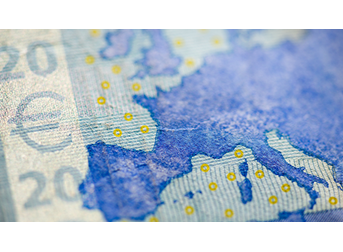Cross border B2B payments to Spain
Quick, simple and transparent international transfers



How we can help your business make its money transfers
Forward Contract
Forwards allow you to buy currency on an agreed future date at a pre-fixed rate. This may require a deposit and allows you to lock in a rate for up to two years.*
Spot Contract
This is an agreement between you and your FX provider to buy currency at the present exchange rate, and it can be used for imminent payments.
FX Orders
If you need a particular exchange rate but have no urgency to purchase straight away, an FX order could help you secure a better deal.
FX Options
Designed for foreign exchange rate management, options can be created as a bespoke solution for your business and its payment needs.**
Spain is one of Europe’s best-performing economies: it ranked as Europe’s sixth-largest economy and the world’s 15th largest in terms of its Gross Domestic Product (GDP) in 2021.
Spain’s main economic sector is its service sector, which accounts for 67.15% of its GDP, followed by industry (20.5%) and agriculture (2.73%). A significant proportion of Spain’s burgeoning tertiary sector is its tourism industry, which accounts for 11.8% of its GDP in 2017. As one might expect, Spain suffered one of the sharpest contractions in Europe as a result of the Coronavirus pandemic; visitor numbers fell by more than 80%, and GDP shrank by 11% as a whole in 2020.
The news since then has been broadly very positive. Spain has seen a remarkable recovery post-pandemic; economic activity increased by 4.7% in 2022 and is projected to grow by 1.3% in 2023, and by 1.7% in 2024.
This comeback was driven in part by €69.5 billion in aid from Europe’s recovery fund, which will be disbursed over 2021-2026. It also speaks to the resilience of the Spanish economy, its inherent potential for growth and the rewards that have been reaped from welcoming foreign businesspeople.
Indeed, the message from the Spanish authorities in recent years couldn’t be clearer: Spain is open to business from overseas companies, with no specific restrictions on what foreign businesses can do. Invest in Spain, a division of one of the Spanish Ministry of Industry’s agencies, exists to promote foreign direct investment (FDI) in Spain and support entrepreneurs who would like to establish companies in Spain by making the start-up process as easy and as hassle-free as possible. They appear to be succeeding; in the first half of 2022, gross foreign direct investment flows increased by 87.7% compared to the same period in 2021.
Spain’s various industries, which include automobiles, pharmaceuticals, logistics, agriculture, wine, and tourism, represent diverse opportunities for investment. You may also find business opportunities in the country’s robust technology industry, or in its powerful maritime economy.
If you decide that you’d like to do business in Spain, it has never been easier to do so. You can set the prevailing exchange rate for future payments with a currency forward contract. Your rate will not, therefore, be affected by the market’s upturns or downturns. While this lets you plan with greater certainty, it also means that, at the time of settlement, you will receive the set rate even if the exchange rate had moved in your favour.
A spot contract may be the best option if you need to make a payment in Spain as a matter of urgency. The contract lets you make the payment at the current exchange rate. You do not need to set exchange rate targets that may not be possible to meet.
We offer three types of FX orders: limit orders, stop loss orders and OCOs. Limit orders can be used when you wish to buy Euros at a better value than the exchange rate at that time.
Guide to business in Spain for foreigners
Is Spain a good place to start a business?
Whilst it is not without its challenges, Spain is a very good country in which to start a business.
Following the global financial crisis of 2008, the Spanish government implemented extensive labour market reforms and restructured the country’s banking system. In 2013, the Spanish government adopted the Market Unity Guarantee Act, which helped facilitate the free flow of goods and services, thus making Spain far more attractive to foreign investment and reduce business operating costs.
A range of other investment incentives exist in Spain. Incentives from national, regional or municipal governments and the EU are provided to both Spanish and foreign companies, including incentives to foster research and development. This aid can take the form of tax guarantees, loans and subsidies.
What are some major industries in Spain?
Spain is a hub for imports and exports: Valencia is the busiest port in all of the Mediterranean and the fifth busiest in Europe. Fossil fuels, chemicals, machinery and consumer goods are imported from across the world, primarily from Germany, France and China. In the four quarters to the end of Q1 2022, cars (£710.1m), mechanical power generators (£685.2m) and medicinal & pharmaceutical products (£354.1m) were among the top five UK goods exported to Spain.
Spain’s key exports reflect the diversity of industry in Spain, and they include pharmaceuticals, automobiles, wine, citrus fruits and other agricultural goods.
Business in Spain is varied and encompasses a number of growing markets. These include agriculture, manufacturing, energy and electricity, all of which are major industries in Spain. The main contributor to the country’s GDP is its services sector; more than 75% of the Spanish population work in the tertiary sector, of which tourism is a key part. Tourism has long been a major contributor to Spain’s economy. The tourist trade accounted for 12% of GDP prior to the pandemic, and it is expected to make a full recovery by 2024.
The cost of starting a business in Spain
If you’re concerned about the costs involved in doing business in Spain, you’ll be relieved to discover that the process need not be prohibitively expensive.
The cheapest way to get started is to form an unincorporated company, either as a sole trader (empresa individual) or with a partnership (sociedad civil). There are no minimum investment requirements with these arrangements, and there is significantly less red tape than registering a limited company.
With that said, the Sociedad Limitada (S.L.), or limited liability company, is the most commonly used business structure in Spain. To start a limited liability company in Spain, you'll need a minimum share capital of €3,000, and it is highly likely that you will need to pay in the region of €1,500 – €2,000+ for the various certificates and lawyer’s fees.
How to open a business in Spain
If you’re thinking about how to do business in Spain and where you should start such an undertaking, the answer is to start by establishing a business. There are a number of options available to you.
EU citizens can register a business in Spain with relative ease, and this is the case if they choose to set up as a partnership or as a sole trader. However, expats from outside the EU will require a work permit to be able to move to Spain and register a business there. Work permits must be renewed every year, but you can apply for residency after five years. If this is granted, you will no longer need to apply on an annual basis.
Registering as a limited company in Spain has a minimum financial requirement, so you’ll need to be able to demonstrate that you have the resources to back your business. The Sociedad Limitada (SL), or S.L. Incorporation, is the most commonly used company type; the structure protects business owners from personal liability in the event of bankruptcy. However, it does also involve additional tax, accounting fees and mercantile obligations, including annual corporation tax returns and statutory accounts. There are also additional declarations that are required, including filing VAT returns (IVA).
The rules are less stringent for sole traders and partnerships, and as an individual you can also set up as a freelancer, known in Spain as profesionales autónomos.
Visit our Brexit Hub to stay up to date with the latest developments regarding the UK’s relationship with Spain and what that will mean for businesses going forward.
What documents do I need for registering a business in Spain?
In addition to either EU citizenship or a valid work permit, you will also require the following to start a business in Spain:
- Foreigner’s tax identification number (NIE)
- Registration to the Mercantile Registry (Registro Mercantil Central, or RMC)
- Company tax identification number (CIF)
- A business bank account with a minimum deposit of €3,000
- Signed deed of incorporation
- Social security registration
If you’re planning to open a subsidiary business in Spain, the process is simpler, but you will need to include the following in your application:
- A copy of the main company’s certificate of incorporation and certificate of good standing
- Spanish tax identification number (NIE)
- A member of staff at the Spanish branch to be a resident in Spain, who will agree to be liable for any company debts and tax payments
What is the corporate tax in Spain?
The general rate of corporation tax (CIT) in Spain is 25%. However, there are other taxes that may also apply, depending on i) the nature of your business and industry and ii) whether or not your organisation is a resident company in the country. It’s worth taking the time to research your corporate tax obligations for conducting business in Spain; this will help ensure that you have all bases covered and that you will be paying the correct figure.
It is worth noting that newly incorporated companies are required to pay a smaller corporate tax; this rate was established at 15%, starting from January 1, 2015, in a bid to encourage investors to set up new companies in Spain.
What are the challenges of doing business in Spain?
There are a various rules and regulations that can pose challenges to small companies looking to expand. Extensive regulatory and administrative procedures impose burdens on recently formed businesses in Spain, and they also make it harder for them to access the resources that they require. A survey conducted in 2020 found that small businesses in Spain spent 369 hours each year dealing with government bureaucracy, the most onerous burden in all of Europe.
Whilst this is the case, however, Spain has seen significant improvements in its World Bank “Ease of Doing Business” ranking, climbing from 51st place in 2010 to 30th place in 2020. This owes in part to the simplification of corporate taxes in 2014 and bankruptcy reforms that were passed in 2015. Improvements in the functioning of the business registry have also reduced the regulatory burden imposed upon small firms and SMEs. The Spanish government has also launched two platforms (Plataforma PYME and the CIRCE platform) that serve as single information points for small and medium-sized enterprises and offer support over the full life cycle of a firm.
What is the business environment in Spain like?
When it comes to work culture, Spain is a diverse and multicultural society. Personal relationships are important in the business environment, so take the time to build a strong network and become familiar with the business customs.
When it comes to employing staff, most employees work a 40-hour week, have 30 days’ annual leave and are given 14 salary payments per year – one payment a month, with additional payments in July and December.
What are the biggest opportunities for doing business in Spain?
You’ll benefit from a ready-made market if you’re looking for an opportunity to grow a tourism business in Spain. More than 30 million foreign tourists visited the country in 2021, making it Europe’s second most-popular tourist destination. If you’re starting a tourism business in Spain, you’ll also benefit from the fact that the World Tourism Organization HQ is located here, providing a great opportunity to build your business with a strong, well-connected network.
Tourism is not, of course, the only option if you’re considering doing business in Spain. Automobiles and pharmaceuticals are among the leading exports in Spain; the country is the second-largest car manufacturer in Europe and the ninth-largest worldwide, with 2.1m vehicles manufactured in 2021, and the pharmaceutical market is valued at $25bn.
Energy is also a growing industry in Spain; the country has invested heavily in renewables. With its rich natural resources and committed support from the government, Spain’s renewable energy industry looks like an attractive prospect for foreign investors.
What is the business etiquette in Spain?
Unless stated otherwise, men and women are expected to wear formal wear, i.e., suits and ties, business dresses, etc. to meetings and official functions.
Spaniards tend to organise meetings comfortably in advance. Last-minute meetings are a rarity in Spanish business life. Spanish businesspeople shake hands firmly upon meeting, and the most senior person is the first to be addressed; Spanish businesses tend to be very hierarchical. If it is appropriate for kissing to take place, your Spanish colleague will initiate it.
Business dinners are common in Spain, and they tend to be rather late affairs; the Spanish often eat as late as 9pm.
Doing business in Spain with Moneycorp
Moneycorp offers global payment solutions for your business needs and extensive options to protect your money from exchange rate movements. Send money to and from Spain with ease through our international payment service.
Sign up for a business account with Moneycorp today.
Get in touch & learn more about how we can send money to and from Spain
Get in touch & learn more about how we can send money to and from Spain



